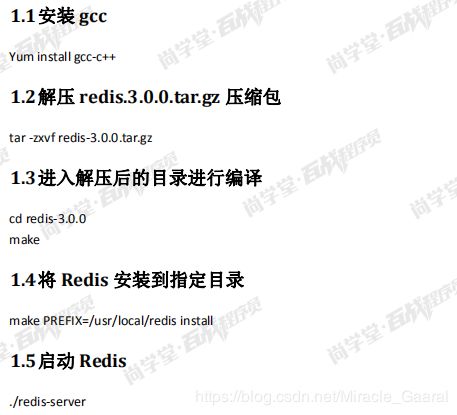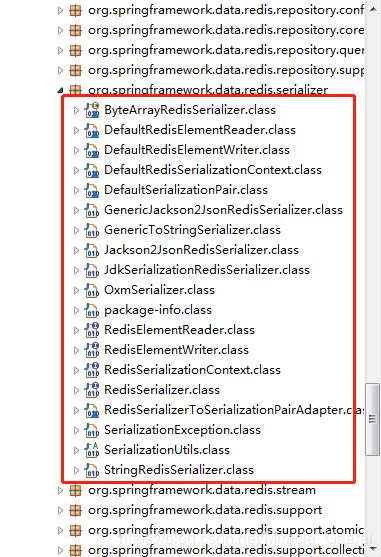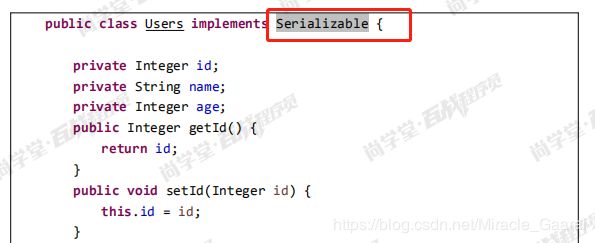SpringBoot----Spring Boot 缓存技术(Ehcache和Spring Data Redis )
一、 Spring Boot 整合 Ehcache
1 修改 pom 文件
org.springframework.boot
spring-boot-starter-cache
net.sf.ehcache
ehcache
2 创建 Ehcache 的配置文件-----可以自定义缓存策略
文件名:ehcache.xml
位置:src/main/resources/ehcache.xml
3 修改 application.properties 文件
spring.datasource.driverClassName=com.mysql.jdbc.Driver
spring.datasource.url=jdbc:mysql://localhost:3306/ssm
spring.datasource.username=root
spring.datasource.password=root
spring.datasource.type=com.alibaba.druid.pool.DruidDataSource
spring.jpa.hibernate.ddl-auto=update
spring.jpa.show-sql=true
spring.cache.ehcache.config=ehcache.xml4 修改启动类------@EnableCaching
package com.bjsxt;
import org.springframework.boot.SpringApplication;
import org.springframework.boot.autoconfigure.SpringBootApplication;
import org.springframework.cache.annotation.EnableCaching;
@SpringBootApplication
@EnableCaching
public class App {
public static void main(String[] args) {
SpringApplication.run(App.class, args);
}
}
5 创建业务层
//@Cacheable:对当前查询的对象做缓存处理
@Cacheable(value="users")
package com.bjsxt.service.impl;
import java.util.List;
import org.springframework.beans.factory.annotation.Autowired;
import org.springframework.cache.annotation.Cacheable;
import org.springframework.data.domain.Page;
import org.springframework.data.domain.Pageable;
import org.springframework.stereotype.Service;
import com.bjsxt.dao.UsersRepository;
import com.bjsxt.pojo.Users;
import com.bjsxt.service.UsersService;
/**
* UsersService接口实现类
*
*
*/
@Service
public class UsersServiceImpl implements UsersService {
@Autowired
private UsersRepository usersRepository;
@Override
public List findUserAll() {
return this.usersRepository.findAll();
}
@Override
//@Cacheable:对当前查询的对象做缓存处理
@Cacheable(value="users")
public Users findUserById(Integer id) {
return this.usersRepository.findOne(id);
}
@Override
public Page findUserByPage(Pageable pageable) {
return this.usersRepository.findAll(pageable);
}
@Override
public void saveUsers(Users users) {
this.usersRepository.save(users);
}
}
6 修改实体类 Users----实现序列化
7 测试
package com.bjsxt.test;
import org.junit.Test;
import org.junit.runner.RunWith;
import org.springframework.beans.factory.annotation.Autowired;
import org.springframework.boot.test.context.SpringBootTest;
import org.springframework.test.context.junit4.SpringJUnit4ClassRunner;
import com.bjsxt.App;
import com.bjsxt.service.UsersService;
/**
* UsersService测试
*
*
*/
@RunWith(SpringJUnit4ClassRunner.class)
@SpringBootTest(classes=App.class)
public class UsersServiceTest {
@Autowired
private UsersService usersService;
@Test
public void testFindUserById(){
//第一次查询
System.out.println(this.usersService.findUserById(1));
//第二次查询
System.out.println(this.usersService.findUserById(1));
}
}
二、 @Cacheable 与@CacheEvict
1 @Cacheable
@Cacheable 作用:把方法的返回值添加到 Ehcache 中做缓存
Value 属性:指定一个 Ehcache 配置文件中的缓存策略,如果么有给定 value,name 则表示使用默认的缓存策略。
Key 属性:给存储的值起个名称。在查询时如果有名称相同的,那么则直接从缓存中将数据返回
1.1业务层
@Override
@Cacheable(value="users",key="#pageable.pageSize")
public Page findUserByPage(Pageable pageable) {
return this.usersRepository.findAll(pageable);
} 1.2测试代码
@Test
public void testFindUserByPage(){
Pageable pageable = new PageRequest(0, 2);
//第一次查询
System.out.println(this.usersService.findUserByPage(pageable).getTotalElements());
//第二次查询
System.out.println(this.usersService.findUserByPage(pageable).getTotalElements());
//第三次查询
pageable = new PageRequest(1, 2);
System.out.println(this.usersService.findUserByPage(pageable).getTotalElements());
}2 @CacheEvict-------清除缓存
@CacheEvict(value="users",allEntries=true)
2.1业务层
@Override
//@CacheEvict(value="users",allEntries=true) 清除缓存中以users缓存策略缓存的对象
@CacheEvict(value="users",allEntries=true)
public void saveUsers(Users users) {
this.usersRepository.save(users);
}2.2测试代码
@Test
public void testFindAll(){
//第一次查询
System.out.println(this.usersService.findUserAll().size());
Users users = new Users();
users.setAddress("南京");
users.setAge(43);
users.setName("朱七");
this.usersService.saveUsers(users);
//第二次查询
System.out.println(this.usersService.findUserAll().size());
}三、 Spring Boot 整合 Spring Data Redis
1 安装 Redis
2 Spring Boot 整合 Spring Data Redis
Spring Data Redis 是属于 Spring Data 下的一个模块。作用就是简化对于 redis 的操做
2.1修改 pom 文件添加 Spring Data Redis 的坐标
org.springframework.boot
spring-boot-starter-data-redis
redis.clients
jedis
3.1.0
2.2编写 Spring Data Redis 的配置类(重点)
package com.kennosaur.config;
import org.springframework.context.annotation.Bean;
import org.springframework.context.annotation.Configuration;
import org.springframework.data.redis.connection.jedis.JedisConnectionFactory;
import org.springframework.data.redis.core.RedisTemplate;
import org.springframework.data.redis.serializer.StringRedisSerializer;
import redis.clients.jedis.JedisPoolConfig;
/**
* 完成对Redis的整合的一些配置
*
*
*/
@Configuration
public class RedisConfig {
/**
* 1.创建JedisPoolConfig对象。在该对象中完成一些链接池配置
*
*/
@Bean
public JedisPoolConfig jedisPoolConfig(){
JedisPoolConfig config = new JedisPoolConfig();
//最大空闲数
config.setMaxIdle(10);
//最小空闲数
config.setMinIdle(5);
//最大链接数
config.setMaxTotal(20);
return config;
}
/**
* 2.创建JedisConnectionFactory:配置redis链接信息
*/
@Bean
public JedisConnectionFactory jedisConnectionFactory(JedisPoolConfig config){
JedisConnectionFactory factory = new JedisConnectionFactory();
//关联链接池的配置对象
factory.setPoolConfig(config);
//配置链接Redis的信息
//主机地址
factory.setHostName("192.168.70.128");
//端口
factory.setPort(6379);
return factory;
}
/**
* 3.创建RedisTemplate:用于执行Redis操作的方法
*/
@Bean
public RedisTemplate redisTemplate(JedisConnectionFactory factory){
RedisTemplate template = new RedisTemplate<>();
//关联
template.setConnectionFactory(factory);
//为key设置序列化器
template.setKeySerializer(new StringRedisSerializer());
//为value设置序列化器
template.setValueSerializer(new StringRedisSerializer());
return template;
}
}
2.3编写测试代码,测试整合环境
2.3.1 修改 pom 文件添加测试启动器坐标
org.springframework.boot
spring-boot-starter-test
2.3.2 编写测试类
package com.bjsxt.test;
import org.junit.Test;
import org.junit.runner.RunWith;
import org.springframework.beans.factory.annotation.Autowired;
import org.springframework.boot.test.context.SpringBootTest;
import org.springframework.data.redis.core.RedisTemplate;
import org.springframework.test.context.junit4.SpringJUnit4ClassRunner;
import com.bjsxt.App;
/**
* Spring Data Redis测试
*
*
*/
@RunWith(SpringJUnit4ClassRunner.class)
@SpringBootTest(classes=App.class)
public class RedisTest {
@Autowired
private RedisTemplate redisTemplate;
/**
* 添加一个字符串
*/
@Test
public void testSet(){
this.redisTemplate.opsForValue().set("key", "北京尚学堂");
}
/**
* 获取一个字符串
*/
@Test
public void testGet(){
String value = (String)this.redisTemplate.opsForValue().get("key");
System.out.println(value);
}
}
3 提取 redis 的配置信息
3.1在 src/main/resource/ 目 录 下 新 建 一 个 配 置 文 件:application.properties
spring.redis.pool.max-idle=10
spring.redis.pool.min-idle=5
spring.redis.pool.max-total=20
spring.redis.hostName=192.168.70.128
spring.redis.port=63793.2修改配置类
@ConfigurationProperties(prefix="spring.redis.pool")
@ConfigurationProperties(prefix="spring.redis")
package com.bjsxt.config;
import org.springframework.boot.context.properties.ConfigurationProperties;
import org.springframework.context.annotation.Bean;
import org.springframework.context.annotation.Configuration;
import org.springframework.data.redis.connection.jedis.JedisConnectionFactory;
import org.springframework.data.redis.core.RedisTemplate;
import org.springframework.data.redis.serializer.StringRedisSerializer;
import redis.clients.jedis.JedisPoolConfig;
/**
* 完成对Redis的整合的一些配置
*
*
*/
@Configuration
public class RedisConfig {
/**
* 1.创建JedisPoolConfig对象。在该对象中完成一些链接池配置
* @ConfigurationProperties:会将前缀相同的内容创建一个实体。
*/
@Bean
@ConfigurationProperties(prefix="spring.redis.pool")
public JedisPoolConfig jedisPoolConfig(){
JedisPoolConfig config = new JedisPoolConfig();
/*//最大空闲数
config.setMaxIdle(10);
//最小空闲数
config.setMinIdle(5);
//最大链接数
config.setMaxTotal(20);*/
System.out.println("默认值:"+config.getMaxIdle());
System.out.println("默认值:"+config.getMinIdle());
System.out.println("默认值:"+config.getMaxTotal());
return config;
}
/**
* 2.创建JedisConnectionFactory:配置redis链接信息
*/
@Bean
@ConfigurationProperties(prefix="spring.redis")
public JedisConnectionFactory jedisConnectionFactory(JedisPoolConfig config){
System.out.println("配置完毕:"+config.getMaxIdle());
System.out.println("配置完毕:"+config.getMinIdle());
System.out.println("配置完毕:"+config.getMaxTotal());
JedisConnectionFactory factory = new JedisConnectionFactory();
//关联链接池的配置对象
factory.setPoolConfig(config);
//配置链接Redis的信息
//主机地址
/*factory.setHostName("192.168.70.128");
//端口
factory.setPort(6379);*/
return factory;
}
/**
* 3.创建RedisTemplate:用于执行Redis操作的方法
*/
@Bean
public RedisTemplate redisTemplate(JedisConnectionFactory factory){
RedisTemplate template = new RedisTemplate<>();
//关联
template.setConnectionFactory(factory);
//为key设置序列化器
template.setKeySerializer(new StringRedisSerializer());
//为value设置序列化器
template.setValueSerializer(new StringRedisSerializer());
return template;
}
}
4 Spring Data Redis 操作实体对象 ------通过JdkSerializationRedisSerializer存储的内容比json方式存储,所占的空间要大5倍以上
4.1.1 创建实体类
4.1.2 测试代码
//重新设置序列化器
this.redisTemplate.setValueSerializer(new JdkSerializationRedisSerializer());
/**
* 添加Users对象
*/
@Test
public void testSetUesrs(){
Users users = new Users();
users.setAge(20);
users.setName("张三丰");
users.setId(1);
//重新设置序列化器
this.redisTemplate.setValueSerializer(new JdkSerializationRedisSerializer());
this.redisTemplate.opsForValue().set("users", users);
}
/**
* 取Users对象
*/
@Test
public void testGetUsers(){
//重新设置序列化器
this.redisTemplate.setValueSerializer(new JdkSerializationRedisSerializer());
Users users = (Users)this.redisTemplate.opsForValue().get("users");
System.out.println(users);
}5 Spring Data Redis 以 JSON 格式存储实体对象
this.redisTemplate.setValueSerializer(new Jackson2JsonRedisSerializer<>(Users.class));
/**
* 基于JSON格式存Users对象
*/
@Test
public void testSetUsersUseJSON(){
Users users = new Users();
users.setAge(20);
users.setName("李四丰");
users.setId(1);
this.redisTemplate.setValueSerializer(new Jackson2JsonRedisSerializer<>(Users.class));
this.redisTemplate.opsForValue().set("users_json", users);
}
/**
* 基于JSON格式取Users对象
*/
@Test
public void testGetUseJSON(){
this.redisTemplate.setValueSerializer(new Jackson2JsonRedisSerializer<>(Users.class));
Users users = (Users)this.redisTemplate.opsForValue().get("users_json");
System.out.println(users);
}




